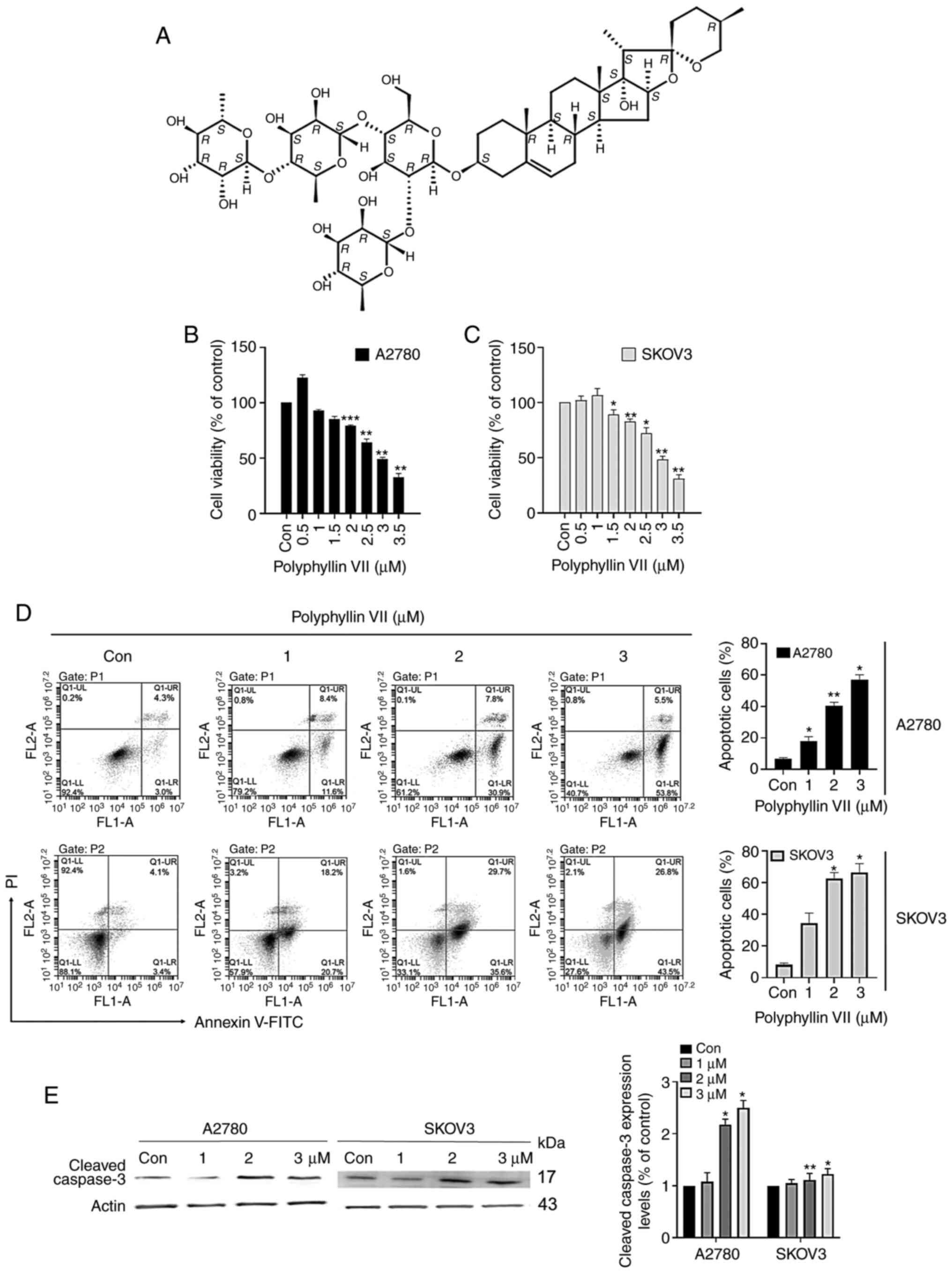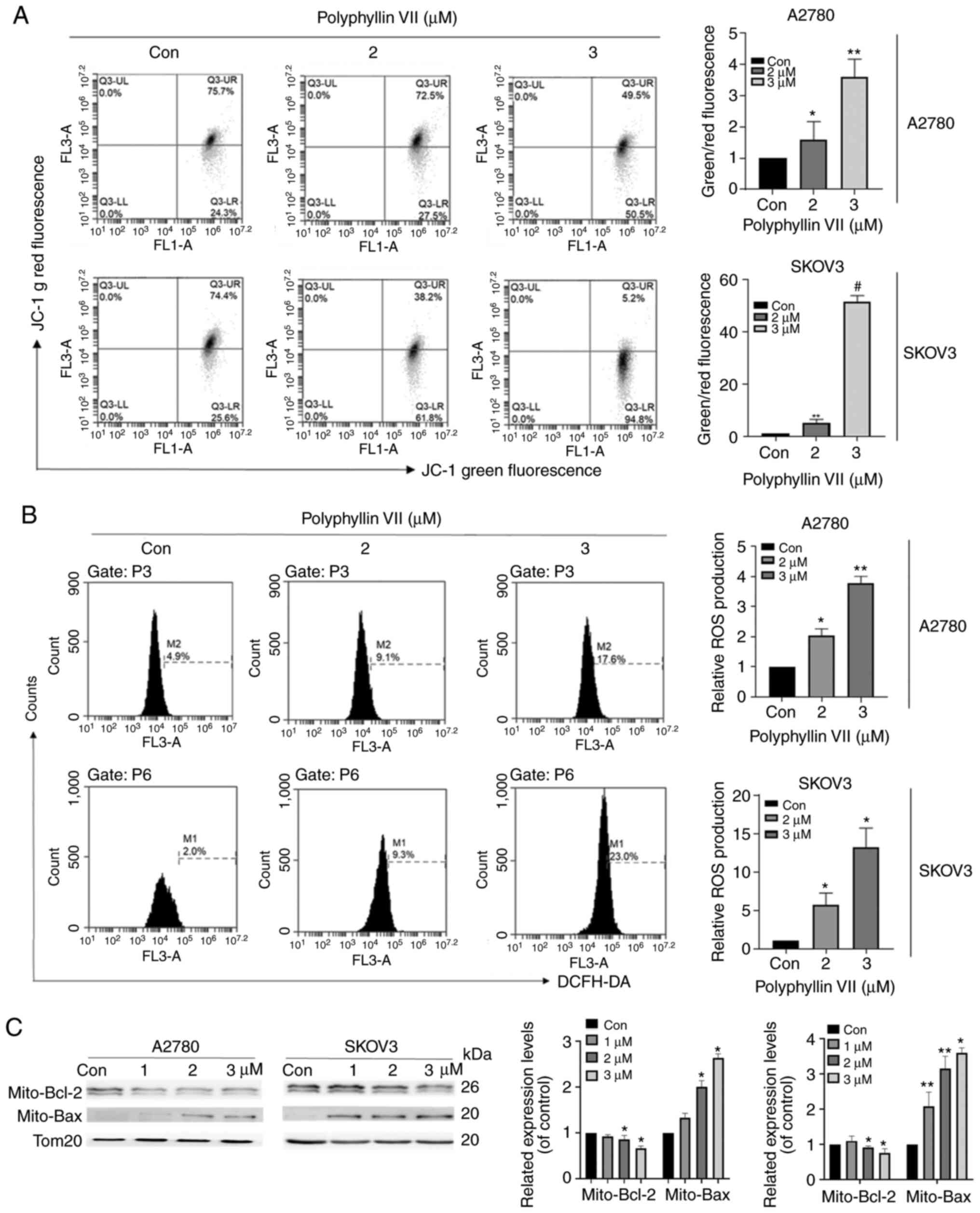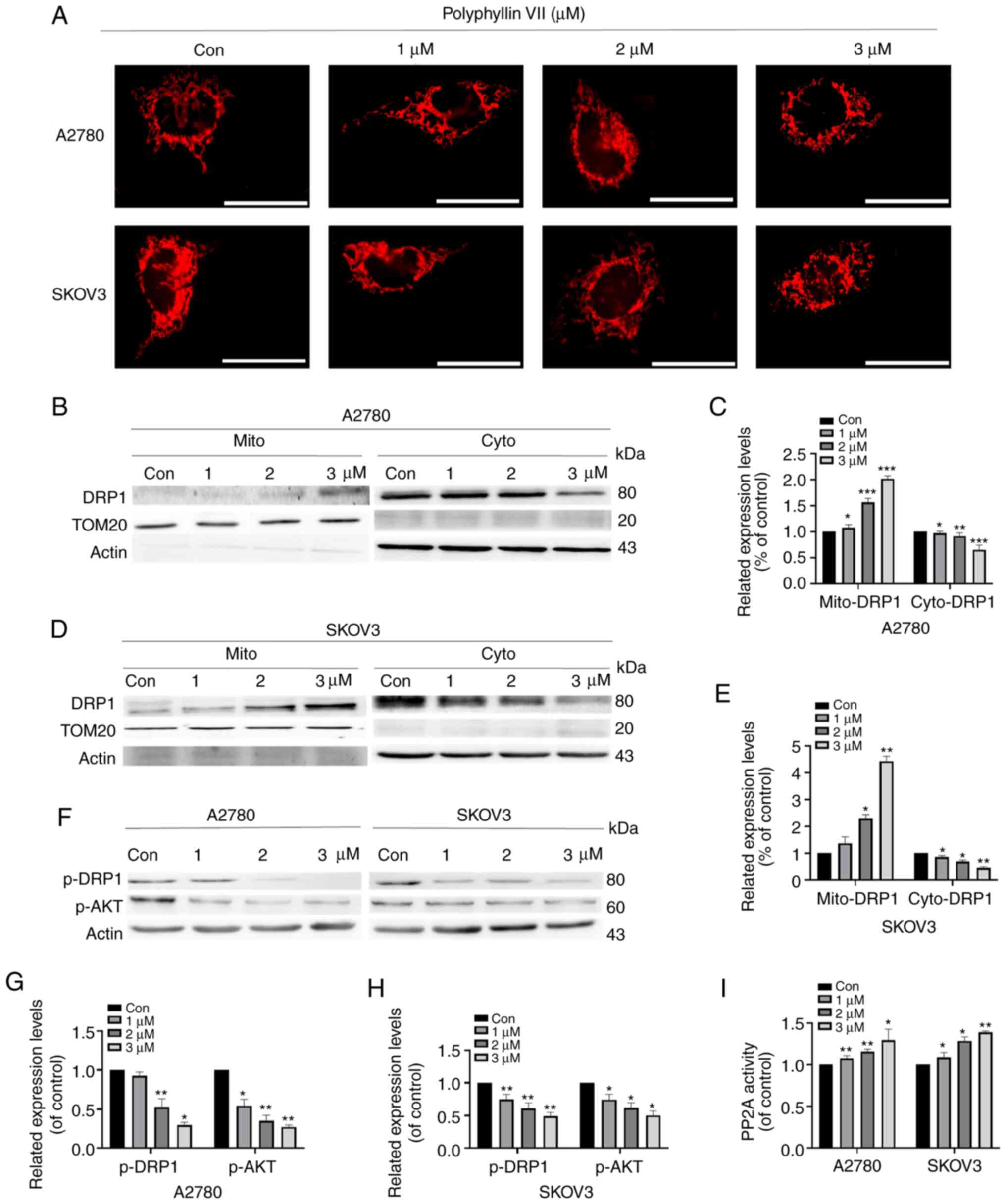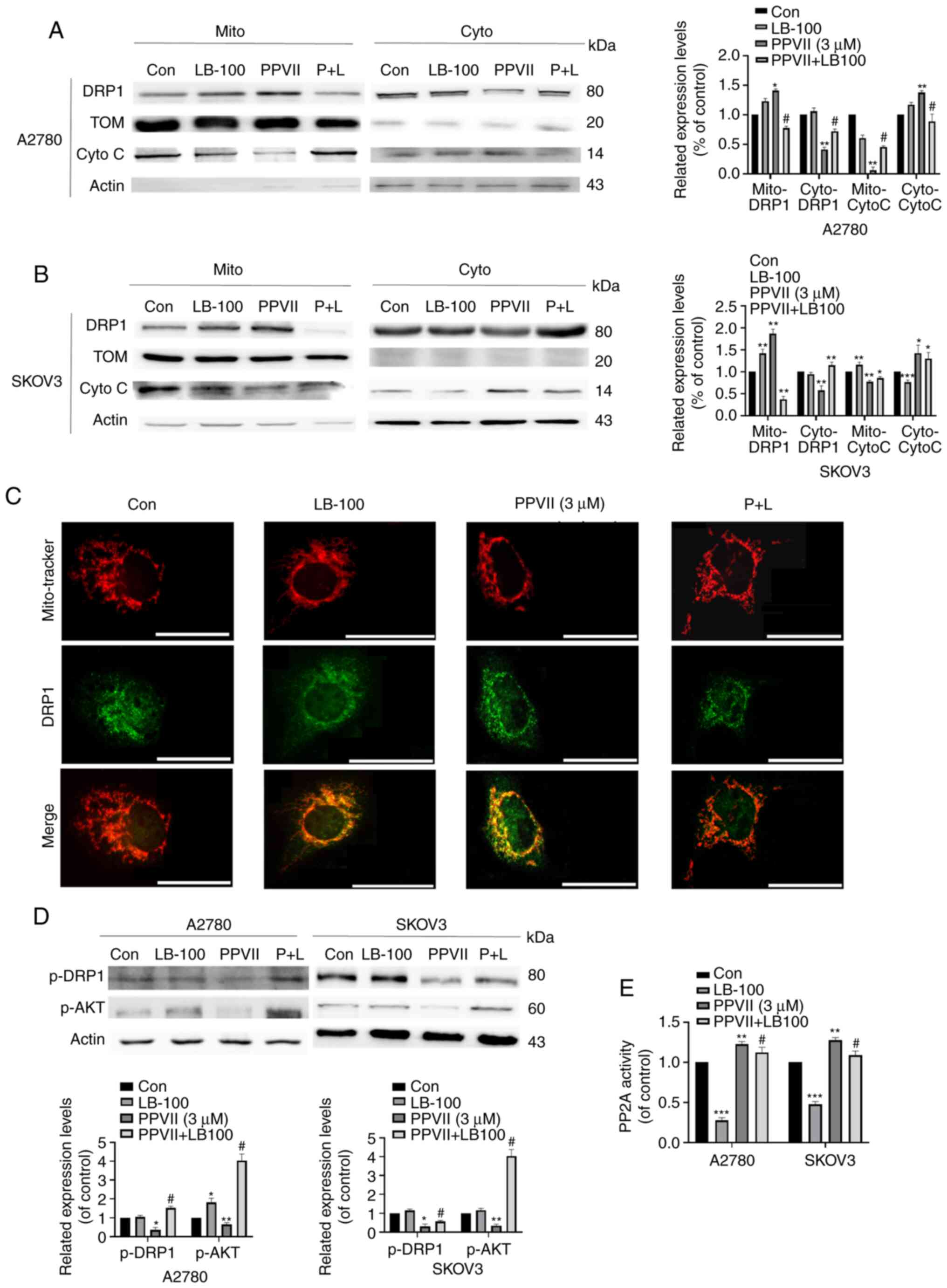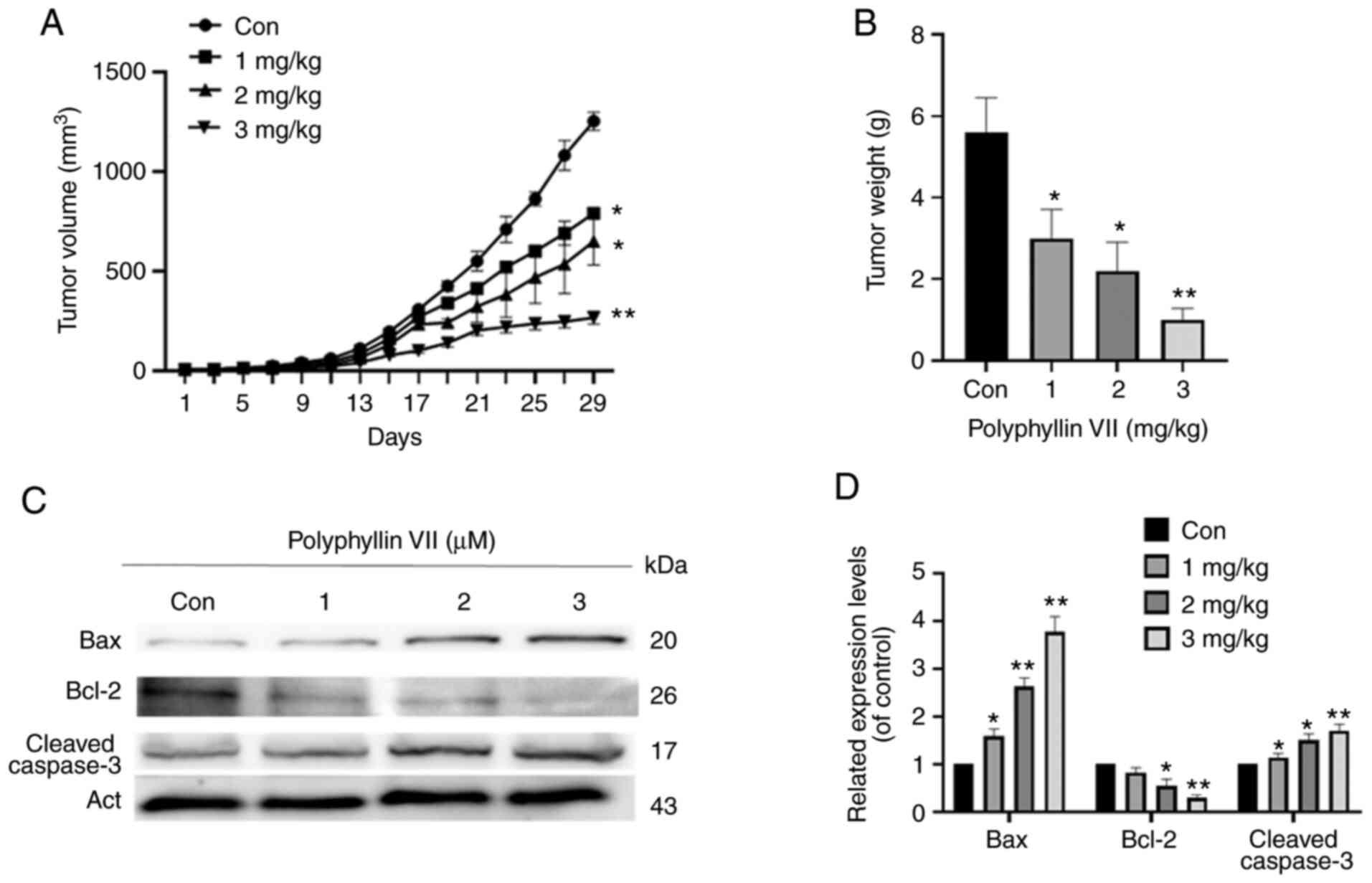|
1
|
Zhang C, Li C, Jia X, Wang K, Tu Y, Wang
R, Liu K, Lu T and He C: In vitro and in vivo anti-inflammatory
effects of polyphyllin VII through downregulating MAPK and NF-ĸB
pathways. Molecules. 24:8752019. View Article : Google Scholar
|
|
2
|
Liu Z, Li N, Gao W, Man S, Yin S and Liu
C: Comparative study on hemostatic, cytotoxic and hemolytic
activities of different species of Paris L. J Ethnopharmacol.
142:789–794. 2012. View Article : Google Scholar : PubMed/NCBI
|
|
3
|
Zhang XF, Cui Y, Huang JJ, Zhang YZ, Nie
Z, Wang LF, Yan BZ, Tang YL and Liu Y: Immuno-stimulating
properties of diosgenyl saponins isolated from Paris polyphylla.
Bioorg Med Chem Lett. 17:2408–2413. 2007. View Article : Google Scholar : PubMed/NCBI
|
|
4
|
Al Sawah E, Marchion DC, Xiong Y, Ramirez
IJ, Abbasi F, Boac BM, Bush SH, Bou Zgheib N, McClung EC,
Khulpateea BR, et al: The Chinese herb polyphyllin D sensitizes
ovarian cancer cells to cisplatin-induced growth arrest. J Cancer
Res Clin Oncol. 141:237–242. 2015. View Article : Google Scholar : PubMed/NCBI
|
|
5
|
Liu X, Sun Z, Deng J, Liu J, Ma K, Si Y,
Zhang T, Feng T, Liu Y and Tan Y: Polyphyllin I inhibits invasion
and epithelial-mesenchymal transition via CIP2A/PP2A/ERK signaling
in prostate cancer. Int J Oncol. 53:1279–1288. 2018.PubMed/NCBI
|
|
6
|
He J, Yu S, Guo C, Tan L, Song X, Wang M,
Wu J, Long Y, Gong D, Zhang R, et al: Polyphyllin I induces
autophagy and cell cycle arrest via inhibiting PDK1/Akt/mTOR signal
and downregulating cyclin B1 in human gastric carcinoma HGC-27
cells. Biomed Pharmacother. 117:1091892019. View Article : Google Scholar : PubMed/NCBI
|
|
7
|
Hong F, Gu W, Jiang J, Liu X and Jiang H:
Anticancer activity of polyphyllin I in nasopharyngeal carcinoma by
modulation of lncRNA ROR and P53 signalling. J Drug Target.
27:806–811. 2019. View Article : Google Scholar : PubMed/NCBI
|
|
8
|
Lin LT, Uen WC, Choong CY, Shi YC, Lee BH
and Tai CJ and Tai CJ: Paris polyphylla inhibits colorectal cancer
cells via inducing autophagy and enhancing the efficacy of
chemotherapeutic drug doxorubicin. Molecules. 24:21022019.
View Article : Google Scholar
|
|
9
|
Yang C, Cai H and Meng X: Polyphyllin D
induces apoptosis and differentiation in K562 human leukemia cells.
Int Immunopharmacol. 36:17–22. 2016. View Article : Google Scholar : PubMed/NCBI
|
|
10
|
Liu Y, Dong X, Wang W, You L, Yin X, Yang
C, Sai N, Leng X and Ni J: Molecular mechanisms of apoptosis in
HepaRG cell line induced by polyphyllin VI via the fas death
pathway and mitochondrial-dependent pathway. Toxins (Basel).
10:2012018. View Article : Google Scholar
|
|
11
|
Zorov DB, Juhaszova M and Sollott SJ:
Mitochondrial reactive oxygen species (ROS) and ROS-induced ROS
release. Physiol Rev. 94:909–950. 2014. View Article : Google Scholar : PubMed/NCBI
|
|
12
|
Adam-Vizi V and Chinopoulos C:
Bioenergetics and the formation of mitochondrial reactive oxygen
species. Trends Pharmacol Sci. 27:639–645. 2006. View Article : Google Scholar : PubMed/NCBI
|
|
13
|
Choudhury AR and Singh KK: Mitochondrial
determinants of cancer health disparities. Semin Cancer Biol.
47:125–146. 2017. View Article : Google Scholar : PubMed/NCBI
|
|
14
|
Tilokani L, Nagashima S, Paupe V and
Prudent J: Mitochondrial dynamics: Overview of molecular
mechanisms. Essays Biochem. 62:341–360. 2018. View Article : Google Scholar : PubMed/NCBI
|
|
15
|
Cannino G, Ciscato F, Masgras I,
Sanchez-Martin C and Rasola A: Metabolic plasticity of tumor cell
mitochondria. Front Oncol. 8:3332018. View Article : Google Scholar : PubMed/NCBI
|
|
16
|
Karbowski M, Lee YJ, Gaume B, Jeong SY,
Frank S, Nechushtan A, Nechushtan A, Santel A, Fuller M, Smith CL
and Youle RJ: Spatial and temporal association of Bax with
mitochondrial fission sites, Drp1, and Mfn2 during apoptosis. J
Cell Biol. 159:931–938. 2002. View Article : Google Scholar : PubMed/NCBI
|
|
17
|
Karbowski M, Arnoult D, Chen H, Chan DC,
Smith CL and Youle RJ: Quantitation of mitochondrial dynamics by
photolabeling of individual organelles shows that mitochondrial
fusion is blocked during the Bax activation phase of apoptosis. J
Cell Biol. 164:493–499. 2004. View Article : Google Scholar : PubMed/NCBI
|
|
18
|
Brooks C, Wei Q, Feng L, Dong G, Tao Y,
Mei L, Xie ZJ and Dong Z: Bak regulates mitochondrial morphology
and pathology during apoptosis by interacting with mitofusins. Proc
Natl Acad Sci USA. 104:11649–11654. 2007. View Article : Google Scholar : PubMed/NCBI
|
|
19
|
Wasiak S, Zunino R and McBride HM: Bax/Bak
promote sumoylation of DRP1 and its stable association with
mitochondria during apoptotic cell death. J Cell Biol. 177:439–450.
2007. View Article : Google Scholar : PubMed/NCBI
|
|
20
|
Hasnat M, Yuan Z, Ullah A, Naveed M, Raza
F, Baig MMFA, Khan A, Xu D, Su Y, Sun L, et al:
Mitochondria-dependent apoptosis in triptolide-induced
hepatotoxicity is associated with the Drp1 activation. Toxicol Mech
Methods. 30:124–133. 2020. View Article : Google Scholar : PubMed/NCBI
|
|
21
|
Li G, Zhou J, Budhraja A, Hu X, Chen Y,
Cheng Q, Liu L, Zhou T, Li P, Liu E and Gao N: Mitochondrial
translocation and interaction of cofilin and Drp1 are required for
erucin-induced mitochondrial fission and apoptosis. Oncotarget.
6:1834–1849. 2005. View Article : Google Scholar
|
|
22
|
O'Connor CW, Perl A, Leonard D, Sangodkar
J and Narla G: Therapeutic targeting of PP2A. Int J Biochem Cell
Biol. 96:182–193. 2018. View Article : Google Scholar : PubMed/NCBI
|
|
23
|
Raman D and Pervaiz S: Redox inhibition of
protein phosphatase PP2A: Potential implications in oncogenesis and
its progression. Redox Biol. 27:1011052019. View Article : Google Scholar : PubMed/NCBI
|
|
24
|
Rincon R, Cristobal I, Zazo S, Arpi O,
Menendez S, Manso R, Lluch A, Eroles P, Rovira A, Albanell J, et
al: PP2A inhibition determines poor outcome and doxorubicin
resistance in early breast cancer and its activation shows
promising therapeutic effects. Oncotarget. 6:4299–4314. 2015.
View Article : Google Scholar : PubMed/NCBI
|
|
25
|
Sugiyama M, Imai A, Furui T and Tamaya T:
Independent action of serine/threonine protein phosphatase in
ovarian cancer plasma membrane and cytosol during
gonadotropin-releasing hormone stimulation. Oncol Rep.
10:1885–1889. 2003.PubMed/NCBI
|
|
26
|
Zheng HY, Shen FJ, Tong YQ and Li Y: PP2A
Inhibits cervical cancer cell migration by dephosphorylation of
p-JNK, p-p38 and the p-ERK/MAPK signaling pathway. Curr Med Sci.
38:115–123. 2018. View Article : Google Scholar : PubMed/NCBI
|
|
27
|
Nader CP, Cidem A, Verrills NM and Ammit
AJ: Protein phosphatase 2A (PP2A): A key phosphatase in the
progression of chronic obstructive pulmonary disease (COPD) to lung
cancer. Respir Res. 20:2222019. View Article : Google Scholar : PubMed/NCBI
|
|
28
|
Perrotti D and Neviani P: Protein
phosphatase 2A: A target for anticancer therapy. Lancet Oncol.
14:e229–e238. 2013. View Article : Google Scholar : PubMed/NCBI
|
|
29
|
Zhang Y, Huang P, Liu X, Xiang Y, Zhang T,
Wu Y, Xu J, Sun Z, Zhen W, Zhang L, et al: Polyphyllin I inhibits
growth and invasion of cisplatin-resistant gastric cancer cells by
partially inhibiting CIP2A/PP2A/Akt signaling axis. J Pharmacol
Sci. 137:305–312. 2018. View Article : Google Scholar : PubMed/NCBI
|
|
30
|
Kim DI, Lee KH, Gabr AA, Choi GE, Kim JS,
Ko SH and Han HJ: Aβ-induced Drp1 phosphorylation through Akt
activation promotes excessive mitochondrial fission leading to
neuronal apoptosis. Biochim Biophys Acta. 1863:2820–2834. 2016.
View Article : Google Scholar : PubMed/NCBI
|
|
31
|
Zhou X, Wang HY, Wu B, Cheng CY, Xiao W,
Wang ZZ, Yang YY, Li P and Yang H: Ginkgolide K attenuates neuronal
injury after ischemic stroke by inhibiting mitochondrial fission
and GSK-3β-dependent increases in mitochondrial membrane
permeability. Oncotarget. 8:44682–44693. 2017. View Article : Google Scholar : PubMed/NCBI
|
|
32
|
Tao A, Xu X, Kvietys P, Kao R, Martin C
and Rui T: Experimental diabetes mellitus exacerbates
ischemia/reperfusion-induced myocardial injury by promoting
mitochondrial fission: Role of down-regulation of myocardial Sirt1
and subsequent Akt/Drp1 interaction. Int J Biochem Cell Biol.
105:94–103. 2018. View Article : Google Scholar : PubMed/NCBI
|
|
33
|
Samanta K, Douglas S and Parekh AB:
Mitochondrial calcium uniporter MCU supports cytoplasmic Ca2+
oscillations, store-operated Ca2+ entry and
Ca2+-dependent gene expression in response to receptor
stimulation. PLoS One. 9:e1011882014. View Article : Google Scholar : PubMed/NCBI
|
|
34
|
Simula L, Nazio F and Campello S: The
mitochondrial dynamics in cancer and immune-surveillance. Semin
Cancer Biol. 47:29–42. 2017. View Article : Google Scholar : PubMed/NCBI
|
|
35
|
Martinou JC and Youle RJ: Mitochondria in
apoptosis: Bcl-2 family members and mitochondrial dynamics. Dev
Cell. 21:92–101. 2011. View Article : Google Scholar : PubMed/NCBI
|
|
36
|
Montessuit S, Somasekharan SP, Terrones O,
Lucken-Ardjomande S, Herzig S, Schwarzenbacher R, Manstein DJ,
Bossy-Wetzel E, Basañez G, Meda P and Martinou JC: Membrane
remodeling induced by the dynamin-related protein Drp1 stimulates
bax oligomerization. Cell. 142:889–901. 2010. View Article : Google Scholar : PubMed/NCBI
|
|
37
|
Lee YJ, Jeong SY, Karbowski M, Smith CL
and Youle RJ: Roles of the mammalian mitochondrial fission and
fusion mediators Fis1, Drp1, and Opa1 in apoptosis. Mol Biol Cell.
15:5001–5011. 2004. View Article : Google Scholar : PubMed/NCBI
|
|
38
|
Frank S, Gaume B, Bergmann-Leitner ES,
Leitner WW, Robert EG, Catez F, Smith CL and Youle RJ: The role of
dynamin-related protein 1, a mediator of mitochondrial fission, in
apoptosis. Dev Cell. 1:515–525. 2001. View Article : Google Scholar : PubMed/NCBI
|
|
39
|
Alberts AS, Thorburn AM, Shenolikar S,
Mumby MC and Feramisco JR: Regulation of cell cycle progression and
nuclear affinity of the retinoblastoma protein by protein
phosphatases. Proc Natl Acad Sci USA. 90:388–392. 1993. View Article : Google Scholar : PubMed/NCBI
|
|
40
|
Glenn GM and Eckhart W: Mutation of a
cysteine residue in polyomavirus middle T antigen abolishes
interactions with protein phosphatase 2A, pp60c-src, and
phosphatidylinositol-3 kinase, activation of c-fos expression, and
cellular transformation. J Virol. 67:1945–1952. 1993. View Article : Google Scholar : PubMed/NCBI
|
|
41
|
Ronne H, Carlberg M, Hu GZ and Nehlin JO:
Protein phosphatase 2A in saccharomyces cerevisiae: Effects on cell
growth and bud morphogenesis. Mol Cell Biol. 11:4876–4884. 1991.
View Article : Google Scholar : PubMed/NCBI
|
|
42
|
Wlodarchak N and Xing Y: PP2A as a master
regulator of the cell cycle. Crit Rev Biochem Mol Biol. 51:162–184.
2016. View Article : Google Scholar : PubMed/NCBI
|
|
43
|
Tseng LM, Liu CY, Chang KC, Chu PY, Shiau
CW and Chen KF: CIP2A is a target of bortezomib in human triple
negative breast cancer cells. Breast Cancer Res. 14:R682012.
View Article : Google Scholar : PubMed/NCBI
|
|
44
|
Bockelman C, Lassus H, Hemmes A, Leminen
A, Westermarck J, Haglund C, Bützow R and Ristimäki A: Prognostic
role of CIP2A expression in serous ovarian cancer. Br J Cancer.
105:989–995. 2011. View Article : Google Scholar : PubMed/NCBI
|
|
45
|
Shih IeM, Panuganti PK, Kuo KT, Mao TL,
Kuhn E, Jones S, Velculescu VE, Kurman RJ and Wang TL: Somatic
mutations of PPP2R1A in ovarian and uterine carcinomas. Am J
Pathol. 178:1442–1447. 2011. View Article : Google Scholar : PubMed/NCBI
|
|
46
|
Xu P, Xu XL, Huang Q, Zhang ZH and Zhang
YB: CIP2A with survivin protein expressions in human non-small-cell
lung cancer correlates with prognosis. Med Oncol. 29:1643–1647.
2012. View Article : Google Scholar : PubMed/NCBI
|















